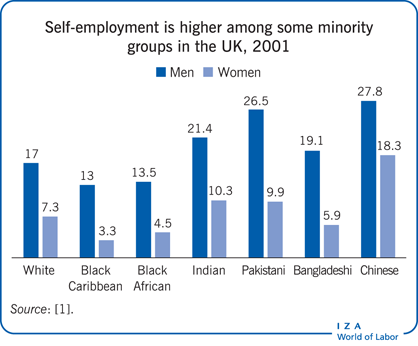Elevator pitch
In many countries, ethnic minority groups are over-represented in self-employment compared with the majority community. The kind of work done by minority entrepreneurs can therefore be an important driver of the economic well-being of their ethnic group. Furthermore, growing the self-employment sector is a policy objective for many governments, which see it as a source of innovation, economic growth, and employment. While self-employment might offer economic opportunities to minority groups, it is important to understand the factors that underlie the nature and extent of ethnic entrepreneurship to evaluate whether policy measures should support it.
Key findings
Pros
Self-employment can be a path to prosperity for immigrant and ethnic groups.
Minorities can exploit ethnic-specific cultural resources.
Ethnic enclaves may provide a protected market.
Business growth can provide employment opportunities for others in the same ethnic group.
Cons
Self-employment may be a response to discrimination in paid employment.
Declining self-employment rates may represent economic progress for an ethnic group.
Business outcomes are often worse for ethnic business owners.
Self-employed ethnic minorities may face poor work conditions.
